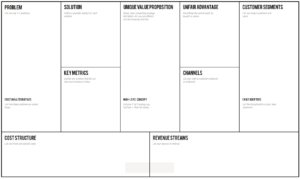When you work for someone else, they typically have a system in place for you. When you start your own business, you’re in charge of creating the system. Dozens of ideas and possibilities tend to float around in the entrepreneur’s head, but these unguided thought processes can become overwhelming without an anchor. Starting a business can feel like rolling a large stone up a hill. There are many irons in the fire that it can become difficult to keep track of everything you need to stay on course.
Count the Cost
In Luke 14:28-30, Jesus makes it clear that we should count the cost before we step into something new.
“For which of you, desiring to build a tower, does not first sit down and count the cost, whether he has enough to complete it? Otherwise, when he has laid a foundation and is not able to finish, all who see it begin to mock him, saying, “This man began to build and was not able to finish” (ESV).
Jesus was referring to a life of discipleship. He made it clear that being a Christian takes our entire being, and we should prepare ourselves accordingly. However, the metaphor still stands when it comes to starting a business. Because I believe in God’s heart for business, I see the opportunity to start a business as a mission field that we get to walk into with divine direction. There will be a cost and a level of risk associated when you start your own business, so it’s important to ensure that it’s something that you feel equipped physically, financially, and spiritually to undertake.
Get Direction
So, how do we access divine direction? The first two verses in the Bible give us a hint.
“In the beginning, God created the heavens and the earth. The earth was without form and void, and darkness was over the face of the deep. And the Spirit of God was hovering over the face of the waters,” Genesis 1:1-2 (ESV).
I love that word— hovering. It creates a sense of anticipation for what’s to come. From something that was absolutely without form, God created intricate systems of art and life. Hebrews 11:3 (NKJV) puts it this way: “By faith we understand that the worlds were framed by the word of God so that the things which are seen were not made of things which are visible.” It was all original.
When God hovered, I like to think that He imagined everything that He was about to set into motion. He underwent the process of ideation. And get this— we’re made in the image of God. That means that He endows us with the capability to create order out of the chaos, too.
There’s an excellent tool that can help you sort out your ideas before you start your own business. It’s called the Lean Canvas, and it helps you transform intangible ideas into actionable planning steps. This model provides specific nuggets for your mind to chew on as it considers a business idea.
Before I show you the steps, remember to consciously invite God into this “hovering” process. After all, He invented it, and He invented you! I am certain that the Holy Spirit wants to reveal certain ideas to you through this process that you wouldn’t come up with on your own.
Use the Lean Canvas
The Lean Canvas is split into two parts— the product portion and the marketing portion. Before we get into that, you need to consider your unique value proposition. A unique value proposition is a single, clear, and compelling message stating why your product or business is different, needed, and worth paying attention to. If you don’t know your unique value proposition right off the bat, that’s okay. Answering the following questions from the Lean Canvas should give you a clearer picture.
The Product
1. What are the top 3 problems you want to solve with your product or business?
2. What are your top 3 solutions?
3. Can you determine your cost structure?
4. Are you able to list key activities that you will measure to track progress?
Marketing
1.What’s your unfair advantage? The thing you have that puts you over the edge?
2. Who is your key audience or target customers?
3. How will you reach your target customers?
4. What are the different ways you can make money (revenue streams) from your product or business?

Created by Ash Maurya. Lean Canvas is adapted from The Business Model Canvas and is licensed under the Creative Commons Attribution-Share Alike 3.0 Un-ported License.
I encourage you to engage with these questions whether you’re 100% going to start your own business this year or you simply have an idea. It works for writers, pastors, tradespeople, and skill sets of all kinds. As people made in the image of God, we really do have the awe-inspiring ability to create something out of nothing. So, will you take the step to start your own business today?
If you want to continue to learn how to start your own business with in-depth instruction and teachings, WealthBuilders University offers courses on business, entrepreneurship, and more!




Thanks for definition of hovering, as I love imagining all the things to come.
Blessings
Yes, “hovering” is such a cool concept! Blessings to you as well.
Thanks for this wonderful lessons. I think this came for the right time because as a young servant of God I need to invest for the better tomorrow.
Of course, thank you for your encouragement and support.
I trust God to be fully embowered to create my systems, check the cost before starting a new. thing. My business is my mission field and I enjoy serving children and the community.
That’s wonderful, Rosemary! Thank you for connecting with Billy and Becky.
Thank you brother Billy,
according to our economic system in our African governments, our Vision and Business plan will never be implemented due to lacking of Capital , or a Credit for it.
A given vision is in a particular time and circumstances. That is the fact I am facing for my Vision about Mission and Church planting, I received this Vision ( repeated in 3 years), in 2003, then 2017 and 2012. The first step I did was to register my Mission company, then to purchase the land for Mission centre, where I began to Issue Humanity service; Pre school, health for Woman and Children, parallel with Home bible study. After two years I found that I have no more money to run this project. I decided to establish a Christian academy at that place, as an Income project. The School fees can assist me to work on with my Mission about church planting, Since 2018 have written several applications for a Grant donation even for only one block building ( two class rooms with one staff room) for USD 30,000.-, (equivalent Tanzania shillings; .67,000,000), but I have not received any positive answer from many missions work, churches and missions companies, most of them they wish me all the best to my program!
Last year in November 2020, the owner of one Primary School, asked our Mission to purchase her School, because she is old and want to leave a country to Canada, she asked me as a first person, and she gave me time up to January 2021. I have written a Business proposal too, and posted to brethren in Jesus christ, asking for a credit, about USD 470,000.- which could be paid in three years (2021 – 2023) through school fees, according to our Business plan. The school has three hundred children, it is a ready made school, already in operation more than twenty years.
My problem is lack of a capital to establish my own financial income projects, which will enable me to become an independent mission and church planter in my own
country.
Thank you for reaching out to Billy and Becky through WealthBuilders! We are blessed to hear about your Vision and Mission and the ministry that is on your heart to accomplish.
We realize that funding in Africa can be very difficult, but we want to encourage you that any project God puts on our heart to do and to fund, we can also look to Him to provide the funding. We agree with you that He will show you the path to take if this is a project He has placed on your heart, and pray for connections for you in Africa to support your God-given vision. Also, continuing to learn and gain knowledge like you are with our blogs, podcasts, and more is part of stewarding the vision God has given you, so please stay encouraged.
We appreciate you connecting with WealthBuilders, and thank you for commenting on Billy’s blog. Please stay in touch as God guides your path with financing this project.
God bless you!
Thank you for this. :: )
I have had a go at it today.
I have filled in the Lean Canvas and begun to answer the questions!
That is great to hear! Best of luck to you, and thank you for your support of WealthBuilders.
Thanks for sharing this amazing article! Starting my own lean canvas now as we speak!